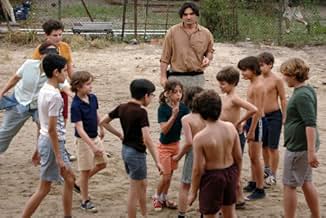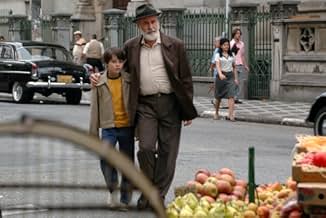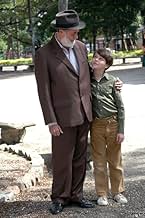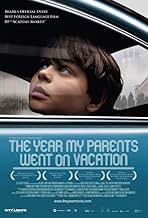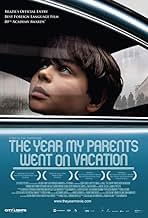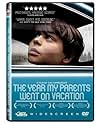CALIFICACIÓN DE IMDb
7.3/10
6.8 k
TU CALIFICACIÓN
Agrega una trama en tu idiomaA boy is left alone in a Jewish neighborhood in 1970, when the World Cup coincides with political crackdowns by the military dictatorship.A boy is left alone in a Jewish neighborhood in 1970, when the World Cup coincides with political crackdowns by the military dictatorship.A boy is left alone in a Jewish neighborhood in 1970, when the World Cup coincides with political crackdowns by the military dictatorship.
- Dirección
- Guionistas
- Elenco
- Premios
- 32 premios ganados y 38 nominaciones en total
Opiniones destacadas
An absolutely beautiful film. We cried and we laughed. The boy is so cute and charming, but he still acted like a man when he had to. I'm telling all my friends about this little gem of a film. The political setup is based on very real events in Brazil at the same time that the international soccer star, Pele, was given an almost godlike stature in that country. The way the filmmakers manage to weave the political story, the personal story - of a boy waiting to be reunited with his parents - and the cultural "shock" of discovering the boy's Jewish roots was outstanding and very moving for me. I think this is a little gem, a masterpiece that will be enjoyed for years to come, like a Cinema Paradiso.
Twelve-year-old Mauro (Michel Joelsas) is a soccer fan who spends hours playing table soccer in his suburban home in Belo Horizonte, Brazil and fantasizes about playing soccer with Pelé and Tostao, the heroes of the Brazilian soccer team that is about to compete for its third World Cup title. He hardly even blinks when his parents tell him that they are going on vacation and will be dropping him off at his grandfather's apartment in Sao Paolo. Brazil's official submission for the 2008 Oscars in the Best Foreign Film category, The Year My Parents Went on Vacation contains all the ingredients for a Hollywood-style exercise in cliché-ridden sentimentality an adorable young boy, a cantankerous but wise old man, and a world-class sports tournament. Yet director Cao Hamburger meshes these elements into a film that is nuanced, honest, and genuinely touching and, in the process, shows how an attitude of welcoming hospitality can make a difference in the lives of those who feel abandoned.
Set in Brazil in 1970 against a backdrop of military dictatorship, Mauro's father (Eduardo Moreira) and Catholic mother (Simone Spoladore) have been forced to go underground because of their political opposition to the government of General Emilio Medici, a military dictator but do not reveal to Mauro the truth about their leaving. Telling the boy that they will come back for him before the start of the World Cup Soccer Tournament, they deliver him to the home of his grandfather Motel (Paulo Autran) in the mostly Jewish Bom Retiro district of Sao Paulo but do not realize that grandpa has just died of a heart attack in his barbershop.
Tired of waiting for his grandfather to return, Mauro enlists the help of a neighbor, an aging Jewish bachelor Shlomo (Germano Haiut) who reluctantly takes him in but is not happy with his newfound task of caring for the youngster. He chastises the boy after he rejects eating herring for breakfast and slaps him across the face when he plays soccer in the hallways while wearing his prayer shawl. Shlomo becomes even more petulant when he inadvertently discovers that Mauro (whom he has been calling Moishela) is a "goy" who has not been circumcised (a very unlikely event when there is a Jewish father). It is only when the rabbi tells him that, like Moses, Mauro has been left on his doorstep by God that he begins to treat Moishela with respect and invites members of the local synagogue to offer him lunch each day at their different apartments.
Mauro's love of soccer helps him to befriend the local Jewish children, forming a bond with adorable 11-year-old Hanna (Daniela Piepsyk) and the community of Italian, Greek and Arab immigrants who are united in their devotion to the Brazilian soccer team. Joelsas is excellent as the highly intelligent energetic boy who must adapt to a strange environment far removed from his familiar surroundings. The film is almost stolen, however, by Piepsyk as the tomboyish Hanna who collects money from the boys to give them a peek at women trying on clothes in her mother's dress shop. When the World Cup begins, however, all the attention in the neighborhood is on soccer but for Mauro, it is mostly a reminder of his parents promise to return.
Spoken mostly in Yiddish, The Year My Parents Went on Vacation contains elements of The Cup, Running on Empty, and Under the Same Moon, but distinguishes itself by the freshness of its light-hearted approach and the outstanding performances of its mostly non-professional actors. Though not primarily a political coming-of-age film, when Hamburger deftly shifts from a rock n' roll dance floor to the sound of fascist soldiers on horseback making arrests of suspected dissidents, it is a jarring introduction to a young man's loss of innocence.
Set in Brazil in 1970 against a backdrop of military dictatorship, Mauro's father (Eduardo Moreira) and Catholic mother (Simone Spoladore) have been forced to go underground because of their political opposition to the government of General Emilio Medici, a military dictator but do not reveal to Mauro the truth about their leaving. Telling the boy that they will come back for him before the start of the World Cup Soccer Tournament, they deliver him to the home of his grandfather Motel (Paulo Autran) in the mostly Jewish Bom Retiro district of Sao Paulo but do not realize that grandpa has just died of a heart attack in his barbershop.
Tired of waiting for his grandfather to return, Mauro enlists the help of a neighbor, an aging Jewish bachelor Shlomo (Germano Haiut) who reluctantly takes him in but is not happy with his newfound task of caring for the youngster. He chastises the boy after he rejects eating herring for breakfast and slaps him across the face when he plays soccer in the hallways while wearing his prayer shawl. Shlomo becomes even more petulant when he inadvertently discovers that Mauro (whom he has been calling Moishela) is a "goy" who has not been circumcised (a very unlikely event when there is a Jewish father). It is only when the rabbi tells him that, like Moses, Mauro has been left on his doorstep by God that he begins to treat Moishela with respect and invites members of the local synagogue to offer him lunch each day at their different apartments.
Mauro's love of soccer helps him to befriend the local Jewish children, forming a bond with adorable 11-year-old Hanna (Daniela Piepsyk) and the community of Italian, Greek and Arab immigrants who are united in their devotion to the Brazilian soccer team. Joelsas is excellent as the highly intelligent energetic boy who must adapt to a strange environment far removed from his familiar surroundings. The film is almost stolen, however, by Piepsyk as the tomboyish Hanna who collects money from the boys to give them a peek at women trying on clothes in her mother's dress shop. When the World Cup begins, however, all the attention in the neighborhood is on soccer but for Mauro, it is mostly a reminder of his parents promise to return.
Spoken mostly in Yiddish, The Year My Parents Went on Vacation contains elements of The Cup, Running on Empty, and Under the Same Moon, but distinguishes itself by the freshness of its light-hearted approach and the outstanding performances of its mostly non-professional actors. Though not primarily a political coming-of-age film, when Hamburger deftly shifts from a rock n' roll dance floor to the sound of fascist soldiers on horseback making arrests of suspected dissidents, it is a jarring introduction to a young man's loss of innocence.
O ano em que meus pais sairam de férias is Cão Hamburger's rather spectacular debút into the area of feature-length films for adult audiences.
Set mostly in the São Paulo neighborhood of Bom Retiro during the 1970 World Cup (and also, not coincidentally, during the "Iron Years" of the last Brazilian military dictatorship), the film tells the story of Mauro (Michel Joelsas), a boy from the state of Minas Gerais who is dropped off in front of the São Paulo apartment of his Jewish grandfather when his parents are forced to hide from the political police. When Mauro arrives, he finds that his grandfather has recently passed away and Mauro is left virtually alone as he waits out his parents' "vacation". In the process, the boy forms an alternative family consisting of the orthodox Jewish immigrant community of his grandfather, a group of neighborhood children including Hanna (spectacularly played by Daniela Piepszyk) and the attractive anarchist Ítalo (Caio Blat). Bom Retiro also discovers Mauro: this son of political activists is Jewish only in heritage and is much more interested in football than anything else.
Indeed, in Hamburger's world, football is the one uniting aspect of Brazilian society. From the apolitical orthodox rabbis to the black goalie on the Jewish football team to the Italians to the anti-dictatorship guerrillas, the one thing that unites everyone is the game. In a São Paulo that is usually defined by its immigrants and work ethic, everything stops for World Cup games and neighborhood matches. In this way, the film is not so much the story of youth in the dictatorship (as is the case with the Chilean Machuca and the Argentine Kamchatka) but rather a story set in that time and a circumstance created by the dictatorship. Instead, it is Hamburger's attempt to describe Brazilian society through the lens of what is, on the surface, the most unusual of Brazilian settings: one of the Jewish neighborhoods of São Paulo. In this world, people of many races, ethnicities and religions mix, united by football even as they are divided by culture. Another factor that unites them is that nearly all of the characters are not particularly tied to politics or concerned with the dictatorship. Indeed, like most people across classes, these characters are much more concerned with providing for their families and even improving their situations. Fighting the political situation becomes a sort of fringe activity that is the "luxury" of youths like Ítalo and ultimately the folly of "responsible adults" like Mauro's parents. It is not that Hamburger advocates this stance but rather that he sees the historical truth that few actively fought against the dictatorship while the great majority silently tried to ignore ituntil it invaded their own lives. As such, the film is a quiet tragedy.
Visually, the film is quite lovely thanks to the cinematography of Adriano Goldman. Shot mostly with small hand-held cameras in close quarters, the film has an intimacy and silence that is intense without being cheesy. Lit in tones of blues and greens and seamlessly edited by Daniel Rezende (Motorcycle Diaries, City of God), it is almost surprisingly well-made for such a "small" film. Finally, it is worth noting that Hamburger did an excellent job casting and working with the youthful and largely inexperienced actors.
Set mostly in the São Paulo neighborhood of Bom Retiro during the 1970 World Cup (and also, not coincidentally, during the "Iron Years" of the last Brazilian military dictatorship), the film tells the story of Mauro (Michel Joelsas), a boy from the state of Minas Gerais who is dropped off in front of the São Paulo apartment of his Jewish grandfather when his parents are forced to hide from the political police. When Mauro arrives, he finds that his grandfather has recently passed away and Mauro is left virtually alone as he waits out his parents' "vacation". In the process, the boy forms an alternative family consisting of the orthodox Jewish immigrant community of his grandfather, a group of neighborhood children including Hanna (spectacularly played by Daniela Piepszyk) and the attractive anarchist Ítalo (Caio Blat). Bom Retiro also discovers Mauro: this son of political activists is Jewish only in heritage and is much more interested in football than anything else.
Indeed, in Hamburger's world, football is the one uniting aspect of Brazilian society. From the apolitical orthodox rabbis to the black goalie on the Jewish football team to the Italians to the anti-dictatorship guerrillas, the one thing that unites everyone is the game. In a São Paulo that is usually defined by its immigrants and work ethic, everything stops for World Cup games and neighborhood matches. In this way, the film is not so much the story of youth in the dictatorship (as is the case with the Chilean Machuca and the Argentine Kamchatka) but rather a story set in that time and a circumstance created by the dictatorship. Instead, it is Hamburger's attempt to describe Brazilian society through the lens of what is, on the surface, the most unusual of Brazilian settings: one of the Jewish neighborhoods of São Paulo. In this world, people of many races, ethnicities and religions mix, united by football even as they are divided by culture. Another factor that unites them is that nearly all of the characters are not particularly tied to politics or concerned with the dictatorship. Indeed, like most people across classes, these characters are much more concerned with providing for their families and even improving their situations. Fighting the political situation becomes a sort of fringe activity that is the "luxury" of youths like Ítalo and ultimately the folly of "responsible adults" like Mauro's parents. It is not that Hamburger advocates this stance but rather that he sees the historical truth that few actively fought against the dictatorship while the great majority silently tried to ignore ituntil it invaded their own lives. As such, the film is a quiet tragedy.
Visually, the film is quite lovely thanks to the cinematography of Adriano Goldman. Shot mostly with small hand-held cameras in close quarters, the film has an intimacy and silence that is intense without being cheesy. Lit in tones of blues and greens and seamlessly edited by Daniel Rezende (Motorcycle Diaries, City of God), it is almost surprisingly well-made for such a "small" film. Finally, it is worth noting that Hamburger did an excellent job casting and working with the youthful and largely inexperienced actors.
10wel2005
Fernando Meirelles is the producer and Cao Hamburguer the director. Daniel Rezende (also from City of God) is the editor. But there is no violence, only sadness and sensibility in this movie. Tells the history of Mauro, a twelve years old boy that sudden has to stay by himself. Because of the dictatorship his parents lives him.It's happens in 1970, during the soccer world cup. The screenplay, written by Bráulio Mantovani (also from City of God) and other two writers and Cao Hamburguer, avoids sentimentality. With intelligent mix of the ordinary life and the heavy atmosphere, the movie offers moments of spontaneous geniality. Music and cinematography is also very good. I saw it during the São Paulo cinema Festival. It's open in Brasil in November. With the quality of the movie, for sure is going to open also in the USA.It's a movie to everybody.
O Ano em Que Meus Pais Saíram de Férias (THE YEAR MY PARENTS WENT ON VACATION) is an amazing little film from Brazil written by Adriana Falcão and Claudio Galperin and directed with panache by Cao Hamberger. It tackles many important issues (political upheaval, religion, ghettos, soccer, aging and more) while telling a very tender story about a young lad forced into a change of life that builds his character and his appreciation for the global community. It works on every level.
The year is 1970, the place is São Paulo during the World Cup Soccer Games, and we meet the young Mauro (Michel Joelsas) as he is swept away from his home by his frantic parents to live in São Paulo with his grandfather: his parents tell him they are going on 'vacation' while in reality they are escaping the dictatorial 'disappearances' that challenged the Brazil of the time. The grandfather lives in the Jewish ghetto and Mauro soon discovers that his would be host has just died. He meets the adjoining neighbor, grumpy old Shlomo (Germano Haiut), who begrudgingly takes Mauro in and allows him to pursue his obsession with soccer. The story winds through the disparities of Jewish life and the governmental changes that are disrupting the flow of this important year for Brazil (there are many film clips of the famous player Pelé which add to the tenor of the story), and as Mauro makes friends with a little girl Hanna (Daniela Piepszyk) the two children are confronted with the realities of political strife and the glories of Brazil's World Cup. By keeping the narrative (in Portuguese, Yiddish and German) to a minimum the beauty of viewing the world and its incongruities through the eyes of children becomes even more touching.
This is one of those films that allows us a vantage of longstanding problems and gives us a fresh view - a factor that helps our understanding of traumas of the history and awareness of similar traumas of the present. Hamberger delivers it with tenderness and is greatly assisted by the artistic cinematography of Adriano Goldman and the musical score by Beto Villares. It is a film well worth seeing at least once! Grady Harp
The year is 1970, the place is São Paulo during the World Cup Soccer Games, and we meet the young Mauro (Michel Joelsas) as he is swept away from his home by his frantic parents to live in São Paulo with his grandfather: his parents tell him they are going on 'vacation' while in reality they are escaping the dictatorial 'disappearances' that challenged the Brazil of the time. The grandfather lives in the Jewish ghetto and Mauro soon discovers that his would be host has just died. He meets the adjoining neighbor, grumpy old Shlomo (Germano Haiut), who begrudgingly takes Mauro in and allows him to pursue his obsession with soccer. The story winds through the disparities of Jewish life and the governmental changes that are disrupting the flow of this important year for Brazil (there are many film clips of the famous player Pelé which add to the tenor of the story), and as Mauro makes friends with a little girl Hanna (Daniela Piepszyk) the two children are confronted with the realities of political strife and the glories of Brazil's World Cup. By keeping the narrative (in Portuguese, Yiddish and German) to a minimum the beauty of viewing the world and its incongruities through the eyes of children becomes even more touching.
This is one of those films that allows us a vantage of longstanding problems and gives us a fresh view - a factor that helps our understanding of traumas of the history and awareness of similar traumas of the present. Hamberger delivers it with tenderness and is greatly assisted by the artistic cinematography of Adriano Goldman and the musical score by Beto Villares. It is a film well worth seeing at least once! Grady Harp
¿Sabías que…?
- TriviaBrazil's Official Submission to the Best Foreign Language Film Category of the 80th Annual Academy Awards. The film was one of the nine films that made it to the January's short list but failed to secure the nomination.
- ErroresWhen Mauro arrives in São Paulo, he looks out to the car window noticing the tall buildings - the known Banespa Tower (now Farol Santander) and the Marchetti building, located in the city's downtown. Not only it's a shot on reverse but completely unpractical to the place he and his parents were going - Bom Retiro is located below downtown - and the particular area they were going, shot from right to the left, is completely off traffic since it's an one-way street that only moves from left to right.
- ConexionesFeatured in Por Dentro do Filme 'O Ano em que Meus Pais Saíram de Férias' (2006)
Selecciones populares
Inicia sesión para calificar y agrega a la lista de videos para obtener recomendaciones personalizadas
Detalles
- Fecha de lanzamiento
- País de origen
- Idiomas
- También se conoce como
- The Year My Parents Went on Vacation
- Locaciones de filmación
- Productoras
- Ver más créditos de la compañía en IMDbPro
Taquilla
- Presupuesto
- BRL 3,000,000 (estimado)
- Total en EE. UU. y Canadá
- USD 807,117
- Fin de semana de estreno en EE. UU. y Canadá
- USD 80,655
- 17 feb 2008
- Total a nivel mundial
- USD 3,218,370
- Tiempo de ejecución1 hora 50 minutos
- Color
- Mezcla de sonido
- Relación de aspecto
- 1.85 : 1
Contribuir a esta página
Sugiere una edición o agrega el contenido que falta

Principales brechas de datos
By what name was O Ano em que Meus Pais Saíram de Férias (2006) officially released in India in English?
Responda






